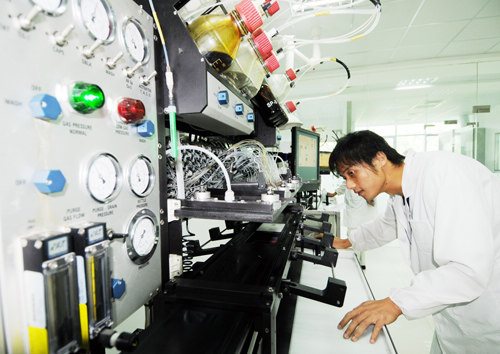|
 |
|
TALENT POOL: A staff member in Suzhou Jima Gene Pharmaceutical Technology Co. Ltd. checks equipment. The company has recruited 12 people from overseas under the 1,000 Talents Program (SHEN PENG) |
"In addition to selecting talented researchers with a background in natural science and technology, the city also wants to attract high-caliber individuals with experience in finance and cultural industry to meet local needs," said Ran Xiaoyi, Deputy Director of the Shanghai Municipal Office of Human Resources.
Stanley Tong, a Hong Kong movie director, Xu Zhong, a pianist and Zhang Xin, a writer, are all on Shanghai's talent list.
People making Shanghai's talent list will receive at least 1 million yuan ($153,800), half of which is a living allowance, and half of which is performance-based pay, reported local paper Shanghai Overseas Chinese News. In addition, they will be given preferential treatments in terms of housing, children's education and financing.
Other local governments have also made similar efforts. In 2008, eastern Jiangsu Province launched a plan to attract 100,000 prestigious professionals from overseas by the year 2012. Beijing, Guangzhou in southern Guangdong Province and Wuxi in Jiangsu have also launched programs to lure talented people from overseas.
So far, most overseas researchers returning to China are hired by universities and research institutes, and a small number by state-owned enterprises.
In 2009, Li Yuanchao, Minister of the Organization Department of the Central Committee of the Communist Party of China, which is in charge of national overseas talent recruitment programs, made a speech at the State-owned Assets Supervision and Administration Commission under the State Council (SASAC). He urged enterprises supervised by the commission, which are all leaders in their industries in China, to hire more world-class managers from overseas.
SASAC-supervised enterprises began recruiting senior executives from around the world in 2001. But among the 122 senior executives hired by these enterprises since 2003, 51 were from the same domestic industry as the recruiting enterprises and 57 were from domestic state-owned enterprises in other industries, according to SASAC statistics.
Jiang Zhigang, an official with the SASAC, said that the salaries offered by Chinese state-owned enterprises were still low compared with international levels.
For example, he said, in 2005, a strong international applicant asked for an annual income of $200,000, but at that time the figure equaled the total payroll of the other seven senior Chinese executives of the recruiting company. Finally, they failed to reach an agreement.
But Liu Cheng, a professor at the Beijing University of Science and Technology, believes the gap in remuneration between Chinese state-owned enterprises and multinationals is not the biggest barrier to the recruitment of foreign executives. According to him, some Chinese state-owned enterprises are extremely bureaucratic institutions, which is difficult for people with overseas working experiences to get used to, though the reform of state-owned enterprises and the phasing-in of modern governance structure are changing the situation.
Qualifications required for the 1,000 Young Talents Program
- Work in natural science or engineering and be no more than 40 years old;
- Have obtained a doctorate degree from famous overseas universities and have more than three years of overseas research work experience;
- Be employed in official teaching or research positions in famous overseas universities, research institutes or the research and development department of famous enterprises;
- Be able to work full time in China after entering the program;
- Be top-notch professionals in their research fields, and have the potential to become future leaders in relevant areas.
Exception can be made for those who have outstanding achievements.
Qualifications required for the 1,000 Talents Program
Applicants should usually be 55 years or younger, have obtained their doctoral degree from overseas universities, and be able to work in China for at least six months in a year. In addition, they should meet at least one of the following criteria:
- Working in famous foreign universities or research institutes and have an academic title equivalent to professor;
- Employed as high-level professionals or senior executives in well-known companies or banking institutions overseas;
- Own intellectual property rights or core technologies and run independent businesses overseas and be familiar with international rules in a certain industry;
- Other high-caliber innovative or business talents urgently needed by China.
The 1,000 Talents Program also has a short-term alternative for top-notch professionals who can work in China for two months in a year.
(Source: 1000plan.com, the programs' official website) | 